Suprax
Suprax dosages: 200 mg, 100 mg
Suprax packs: 30 pills, 60 pills, 90 pills, 120 pills, 180 pills, 270 pills, 360 pills
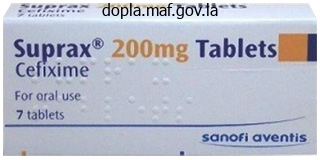
Discount suprax 100 mg buy line
A Cooled Specimen Gets a Chilly Reception A new phlebotomist was working the early shift at a medical center and had already completed most of his assigned draws antibiotic lyme suprax 200 mg purchase with amex. The draw was successful, and although the blood flowed into the tubes slowly, he managed to fill all three tubes. He had only one more draw to do and the patient was on that same floor, so he quickly drew her, returned to the lab, and delivered the specimens to central processing. References Advance staff, the Future of Specimen Tracking & Management, Advance for the Laboratory, Volume 12, Issue 11, page 24, October 31, 2012. Procedures and Devices for the Collection of Diagnostic Capillary Blood Specimens by Venipuncture, Approved Standard. Procedures for the Handling and Processing of Blood Specimens, Approved Guideline. Occupational exposure to bloodborne pathogens: Needlestick and other sharps injuries; final rule. Impact of blood sample collection and processing methods on glucose levels in community outreach studies. Demonstrate knowledge of nonblood specimens and tests, and define associated terminology. Overview Although blood is the specimen of choice for many laboratory tests, various other body substances are also analyzed. Because all human body substances are potentially infectious, standard precautions must be followed when handling all nonblood specimens. This article focuses on the different types of nonblood specimens and tests, including procedures for collecting and handling them. A phlebotomist with detailed knowledge of nonblood specimen collection and handling, including the processing and testing for some specimens, helps ensure the quality of the specimens and the accuracy of test results. Nonblood Specimen Types Nonblood specimens include liquid and semiliquid substances produced by the body and found in the intracellular and interstitial spaces and within various organs. As with blood specimens, much can be learned about the health status of the body from testing these specimens. Nonblood Specimen Labeling Proper labeling of nonblood specimens helps avoid testing delays that can compromise patient care. Label nonblood specimens immediately following collection in the presence of the patient, using the same identifying information as blood specimens. In addition, since many body fluids are similar in appearance, include the type and/or source of the specimen on the label. Because the lid is typically removed for testing, apply the label to the container, not the lid, to avoid misidentification.
Sarothamnus vulgaris (Scotch Broom). Suprax.
- Are there any interactions with medications?
- Are there safety concerns?
- What is Scotch Broom?
- Fluid retention, sore muscles, swelling, low blood pressure, menstrual disorders, heavy bleeding after giving birth, bleeding gums, gout, arthritis-like pain, nerve disorders, gallbladder and kidney stones, spleen disorders, heart disorders, and other conditions.
- Dosing considerations for Scotch Broom.
- How does Scotch Broom work?
Source: http://www.rxlist.com/script/main/art.asp?articlekey=96389
Discount suprax 100 mg buy online
An additive is any substance placed within a tube other than the tube stopper or if the tube is glass infection 0 mycoplasme 100 mg suprax buy fast delivery, the silicone coating. Tube additives have one or more specific functions, such as preventing clotting or preserving certain blood components. Blood collected in additive tubes may or may not clot, depending on the additive type. Some whole-blood specimens are used directly for testing; others are centrifuged to separate the cells from the fluid portion. If the additive is a clot activator, the blood will clot and the specimen must be centrifuged to obtain the fluid portion. The amount of additive in a tube has been calibrated by the manufacturer to function optimally and produce accurate results with the amount of blood it takes to fill the tube to the capacity or volume indicated on the tube label. Specimen quality can be compromised and lead to inaccurate results if the tube is underfilled, so it is important to allow additive tubes to fill with blood until their normal vacuum is exhausted. Caution: An underfilled additive tube will have an incorrect blood-to-additive ratio, which can cause inaccurate test results. Blood collected in a tube will clot when there is nothing in the tube to prevent it. The shield is designed to protect lab personnel from blood drops remaining on the stopper after the tube is removed from the needle, and from aerosols (mists) and sprays of specimen or any blood on the stopper or rim of the tube when the stopper is removed from the tube. The rigidity of the plastic also prevents removal of the stopper using a "thumb-roll" or "pop-off" technique that has been shown to cause aerosol formation. However, for some tubes, the stopper color indicates a special property of the tube. For example, a royal blue stopper indicates a tube that is as free of trace element contamination as possible rather than a type of additive. Description Occasionally, there is more than one stopper color for the same additive. In addition, although color coding is generally universal, it may vary slightly by manufacturer. Common stopper colors, what they indicate, and what departments use them are shown in Table 7-2. Common Stopper Colors, Additives, Sample Type, and Departments Description Misconception Alert: Would you be able to correctly answer the following question from the Jones & Bartlett Learning TestPrep Plastic red tops used to collect blood specimens usually contain: Anticoagulants Clot activators No additives Preservatives 33% of the students who answered this question incorrectly chose "no additives. Red-top tubes are serum tubes which means the blood in them clots because they do not contain an anticoagulant to prevent it. They do, however, contain clot activators (the correct answer) because plastic tubes are so smooth inside that platelet aggregation and adhesion are inhibited, resulting in delayed or incomplete clotting. Improper handling or storage can affect additive integrity and tube vacuum, which can lead to compromised test results or improper filling, respectively.
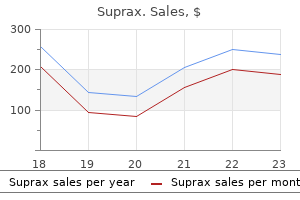
Suprax 100 mg purchase on line
Dehydration Dehydration (decrease in total body fluid) virus definition biology 200 mg suprax purchase with mastercard, which can occur, for example, with persistent vomiting or diarrhea, causes hemoconcentration, a condition in which blood components that cannot easily leave the bloodstream become concentrated in the smaller plasma volume. In addition, it is often difficult to obtain blood specimens from dehydrated patients. Consequently, blood specimens collected soon after a meal or snack are unsuitable for many laboratory tests. Diet effects on analytes are generally temporary and vary depending upon the amount and type of food or drink and the length of time between ingestion and specimen collection. Requiring a patient to fast or follow a special diet up until specimen collection eliminates most dietary influences on testing. Fasting is normally done overnight beginning after the last evening meal or sometimes after midnight, with specimens collected the following morning before the patient has eaten. Consequently, fasting specimens, especially those requiring a 12-hour fast, should be collected promptly without unreasonable delay. Key Point: Some healthcare workers and patients mistakenly think fasting means going without food and all liquids including water. Refraining from drinking water while fasting can result in dehydration that can make blood collection more difficult and negatively affect test results. The following are examples of how some analytes can be significantly affected by the consumption of certain types of food or drink and the excess consumption of some fluids. Lipemia can be present for up to 12 hours, which is why accurate testing of triglycerides (a type of lipid) requires a 12hour fast. In addition, some chemistry tests cannot be performed on lipemic specimens because the cloudiness interferes with the testing procedure. When a test requires a fasting specimen but the serum or plasma sample submitted is lipemic, it is a clue that the patient may not have been fasting. Long-term starvation decreases cholesterol, triglycerides, and urea levels and increases creatinine, ketone, and uric acid levels. Diurnal/Circadian Variations the levels of many blood components normally exhibit diurnal (daily) or circadian (having a 24-hour cycle) variations or fluctuations. Factors that play a role in diurnal variations include posture, activity, eating, daylight and darkness, and being awake or asleep. For example, melatonin levels are affected by light; they increase at night when it is dark and decrease during daylight hours. Key Point: Tests influenced by diurnal variation are often ordered as timed tests; it is important to collect them as close to the time indicated as possible. Drug Therapy Some drugs alter physiologic functions, causing changes in the concentrations of certain blood analytes. Consequently, it is not uncommon for physicians to monitor levels of specific blood analytes while a patient is receiving drug therapy. Other thiazide-type medications that lower blood volume can increase blood levels of nitrogenous waste such as urea, a condition called azotemia. Key Point: Of special concern to phlebotomists are the anticoagulants warfarin and heparin and over-the-counter drugs like aspirin that can cause prolonged bleeding after venipuncture.
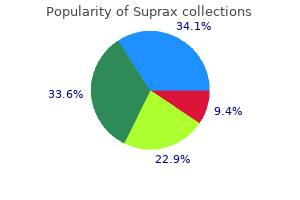
Buy suprax 100 mg cheap
Key Point: the pulmonary artery is the only artery that carries deoxygenated antibiotics quiz pharmacology effective 200 mg suprax, or oxygen-poor, blood. It is part of the pulmonary circulation and carries deoxygenated blood from the heart to the lungs. Most veins of the body are part of the systemic circulation that carries blood that is low in oxygen (deoxygenated or oxygen poor) and high in carbon dioxide from the tissues back to the right atrium of the heart. Because systemic venous blood is oxygen poor, it is much darker and more bluish red than normal arterial blood. It is part of the pulmonary circulation system and carries oxygenated blood from the lungs back to the heart. The walls of veins are thinner than those of arteries because the blood is under less pressure than arterial blood. Blood is kept moving through veins by skeletal muscle movement, valves that prevent the backflow of blood, and pressure changes in the abdominal and thoracic cavities during breathing. The largest veins in the body are the superior and inferior venae cavae (singular, vena cava). They are like a bridge between the arterial and venous circulation that transports blood from the arterioles to the venules. In the systemic circulation, arterial blood delivers oxygen and nutrients to the capillaries. In the pulmonary circulation, carbon dioxide is delivered to the capillaries in the lungs and exchanged for oxygen. Capillaries are composed of a single layer of endothelial cells enclosed in a basement membrane. It is made up of a single layer of endothelial cells with an underlying basement membrane, a connective tissue layer, and an elastic internal membrane. Valves Venous valves are thin membranous leaflets composed primarily of epithelium similar to that of the semilunar valves of the heart. As blood is moved forward by the movement of skeletal muscle, for example, the valves help keep it flowing toward the heart by allowing blood to flow in only one direction. A: Contracting skeletal muscle compresses the vein and drives blood forward, opening the proximal valve while the distal valve closes to prevent backflow of blood. B: When the muscle relaxes again, the distal valve opens and the proximal valve closes until blood moving in the vein forces it to open again.

Best suprax 100 mg
Eating Disorders with Purging or Compensatory Behaviors Those who engage in purging or com pensatory behaviors as a component of their eating disorder are at risk for complications related to their purging behaviors bacteria que causa cancer de estomago order suprax with a mastercard. Purging can lead to electrolyte abnormalities, arrhythmias, and cardiomyopathy, par ticularly if ipecac is used to induce vomiting. Additional medical workup may be indicated to rule out other causes of vomiting or diarrhea, particularly if the vomiting is unintentional. Laboratory testing should include a metabolic panel with liver function tests and serum phosphate, calcium, and magnesium; coagulation assay; a complete blood count with differential cell count; and serum levels of testosterone, thyroid-stim ulating hormone, 25-hydroxyvitamin D, B]2, folate, and thiamine. This evaluation will screen for electro lyte abnormalities, nutritional inadequacy (albumin), liver injury, hypothyroidism, primary hyperthyroid ism leading to weight loss, anemia of chronic disease, hypogonadism, coagulation abnormalities due to vita min K deficiency, and other vitamin deficiencies that can lead to neuropsychiatric and skeletal complica tions of anorexia nervosa. We recommend that a detailed sub stance use history be obtained; this list should be considered the minimum list of substances that a patient may be ingesting. Many clinical tri als of patients with body image disturbances either excluded men or failed to recruit a sufficiently large number of men. Mirror exposure therapy is a form of exposure ther apy during which a patient stands in front of a mirror and describes his outward appearance to a therapist. The patient is typically asked to focus on one body part at a time and may be prompted to comment on emotions that arise without negatively evaluating the specific body part. We recommend mirror exposure therapy delivered by an experienced clinician as first-line treatment for body image dissatisfaction, as it has been shown to have a moderate effect in several randomized controlled tri als, although these trials included only a small number of men. Clinicians should be aware that clinical wors ening has been reported for individuals with recent nonsuicidal self-injurious behaviors. Mirror exposure therapy has not been studied in isolation for body dysmorphic disorder. Decision to Hospitalize Intensive outpatient care for anorexia nervosa is no less effective than prolonged inpatient hospitalizations. The treatment is divided into 3 phases over 6 to 12 months with the entire family present for sessions: "Weight restoration," "Transitioning control of eating back to the adolescent," and "Adolescent issues and termina tion. Psychotherapeutic Treatments for Adults Clinical trials of psychotherapy for adults with anorexia ner vosa have so far failed to show benefit for any spe cific treatment modality due to very poor treatment adherence by this population. Based on clinical experience and the lim ited available evidence, we recommend that clinicians engage treatment-seeking men with anorexia nervosa in the psychotherapeutic modality that they find most acceptable. Clinicians should attempt to mobilize the patients support network and provide psychoeduca tion to help them support the patient in his recovery. Pharmacotherapy Several pharmacological inter ventions have been trialed in adults with anorexia nervosa with generally poor results. Individuals with anorexia nervosa often have mul tiple micronutrient deficiencies, including zinc defi ciency.
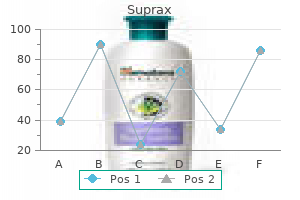
Order suprax mastercard
Metachronous: appear after primary treatment Oligometastatic disease was previously considered incurable antibiotics for bronchitis order genuine suprax online, but this treatment paradigm is now under question. Limited data on the benefit of local therapy are available, but studies have shown promising results. A propensity-matched analysis studying patients with synchronous metastases at the time of diagnosis showed a benefit to comprehensive local therapy. The majority had metastases that had non-squamous histology (89%) and had 1 metastasis (72%). Of the patients, 44/90 (49%) had metastases confined to the brain and 59% had brain metastases and metastases to other organs. Chemotherapy included a carboplatin-based doublet in 78% and a cisplatin-based doublet in 14%. Univariate analysis showed that comprehensive local therapy, non-squamous histology (p =. Eventually, 46/90 developed a new metastatic lesion, with 20 of those being in the brain. Patients with N1-N3 nodal involvement were considered to have 1 metastasis such that 2 additional extranodal metastases would qualify. Randomization included local therapy (surgery and/or radiation) and maintenance therapy versus maintenance therapy alone (which could be observation) in patients with 3 or fewer metastatic sites with stable/responsive disease after first-line systemic therapy. After systemic therapy, 74 patients were eligible for the study, of which 49 entered randomization. Twenty-five patients received consolidative local therapy, with 24 undergoing maintenance. Of patients receiving local therapy, 48% were treated with radiation alone, 24% had surgery and radiation, 20% received chemoradiation, and 4% received surgery alone. Postoperative radiation should be delivered after surgical resection given high local recurrence rates with surgery alone. Histology: Squamous Versus Non-squamous Histology is not a significant prognostic indicator, but it does affect treatment sensitivities and possible adverse effects. Meanwhile, those with squamous cell histology had significant improvement in survival with the cisplatin/gemcitabine arm over the cisplatin/pemetrexed arm (10. However, this study was restricted to non-squamous cell carcinoma due to increased bleeding seen in the preceding phase 2 study. The dangers of bevacizumab in squamous cell histology were thought to be due to the central location of these tumors and their proximities to vascular structures, but these do not appear to be definite, independent risk factors. Of the 15 treatment-related deaths in the bevacizumab group, 5 were from pulmonary hemorrhage. Thus, bevacizumab is contraindicated in those with squamous cell histology, and its serious side effects should be properly discussed with all other patients. For this reason, immunotherapy is contraindicated in those with autoimmune disorders and those who are on high doses of immunosuppressive agents. The immune checkpoint inhibitors currently available are pembrolizumab, nivolumab, durvalumab, and atezolizumab.
Syndromes
- If you have diabetes, heart disease, kidney problems, or certain other conditions, you may need to be monitored more closely.
- Bowel or bladder incontinence
- Errors may make it hard for people to understand the person (only family members may be able to understand a child)
- Dizziness
- Nervous system diseases that are getting worse
- Difficulty swallowing
- Head MRI
Suprax 200 mg buy with mastercard
Growth factor also did not have an impact on response rate in the accelerated group virus quarantine suprax 200 mg order overnight delivery, and these patients actually had reduced survival. These findings were most likely due to the intensity of chemotherapy itself, but the addition of growth factor had no effect. However, they were unable to be replicated in the United States, where 2 follow-up trials failed to show improved response rate and survival with irinotecan. The recommended regimen still remains cisplatin or carboplatin in combination with etoposide. Three-drug regimens such as cisplatin or carboplatin with etoposide and paclitaxel led to unacceptable toxicities. Some studies found a modest improvement in median survival times with higher doses of chemotherapy, but many others did not. The standard dose was defined as etoposide 80 mg/m2 on days 1 to 3 and cisplatin 80 mg/m2 on day 1 every 3 weeks. The high dose was etoposide 80 mg/m2 on days 1 to 5 and cisplatin 27 mg/m2 on days 1 to 5 every 3 weeks. Overall, there were no significant differences in median survival and complete response rates. Furthermore, patients who received higher dose chemotherapy had more toxicities, including leukopenia, thrombocytopenia, febrile neutropenia, and weight loss. Progression-free survival appeared to be better with topotecan, but there was no difference in overall survival. There was also no difference in quality of life between those who received additional treatment versus observation. The investigators found that compared to observation, maintenance therapy had no effect on 1-year mortality, 2-year mortality, overall survival, or progression-free survival. A recent trial found that initial treatment with carboplatin/etoposide/atezolizumab followed by maintenance atezolizumab significantly improved progression-free survival and overall survival. Disease progression during initial treatment is referred to as refractory disease (Table 17-1). Disease progression within 3 months after completion of initial treatment is refractory disease. Response rates are slightly better if there is disease progression more than 3 months after completing therapy. Prophylactic cranial irradiation may cause neurologic complications, especially in elderly patients.
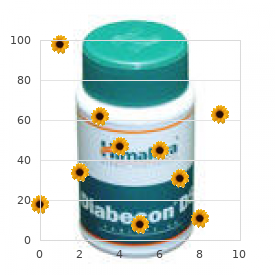
Cheap suprax 100 mg with amex
This explains the increased fibrosis and arrangement of collagen fibers in bundles in radicular pulp compared to more diffuse deposition in the coronal pulp should you always take antibiotics for sinus infection buy suprax 100 mg low cost. Observing a degree of fibrosis (scarring) due to the conversion of loose connective tissue into a dense fibrous tissue is not uncommon [8]. True pulp stones are rare and comprise a central cavity with remnants of epithelial cells, may contain tubules, and could be surrounded by odontoblasts-like cells. On the basis of location, denticles could be divided into (i) Free denticles, which are surrounded entirely by pulp and are not associated with dentin; (ii) Adherent, which are partly attached to the dentin; and (iii) Embedded, which are entirely surround by the dentin. True and free pulpal stones are commonly found in teeth with incomplete root formation. In teeth with fully developed roots, the stones are attached or embedded entirely in the dentinal wall. In histologic section, they usually possess characteristic concentric layer of mineralized tissue. In older teeth, pulp stones may contain atubular or tubular dentin surrounded by fibrodentin. A tooth may have single or multiple stones of fluctuating sizes (from minute to large), which can result in occlusion of pulpal space [9]. Pulp stones have been observed in patients with systemic or genetic diseases like dentin dysplasia, dentinogenesis imperfecta, and Van der Woude syndrome [10]. Mandibular teeth have a higher incidence of pulp stones with first molars being most commonly affected [11]. These stones are known to offer difficulty in endodontic access to root canals and their shaping while root canal treatment [1, 12]. If required, pulp stones can be sectioned out of the access cavity by burs or by ultrasonic tips [13]. The usage of ultrasonic tips and sodium hypochlorite has synergistic effect on removal of these stones [14]. However, in the event of inflammation and as a result of swelling, the tooth becomes percussion-sensitive and when solid food is chewed, severe pain can be experienced. It is frequently identified in radiographs as a well-defined radiolucency, often less than 2 cm in size. Occasional giant cells, cholesterol clefts, Russel bodies (collection of gamma globulins produced by plasma cells) and scattered epithelial rests of Malassez can also be seen in granulation tissue. If left untreated, they can grow large, progress into a periapical/radicular cyst, or become acutely infected [16]. The Biology of Pulp and Dentine: A Historic, Terminologic-Taxonomic, Histologic-Biochemical, Embryonic and Clinical Survey, Monographs in Oral Science, vol. Scanning electron microscope study of the predentin-pulpal border zone in human dentin. Van der Woude syndrome with sensorineural hearing loss, large craniofacial sinuses, dental pulp stones, and minor limb anomalies: report of a four-generation Thai family.
Discount suprax 100 mg
Reactionary tertiary dentin is formed in scenarios where odontoblasts become hyperplastic and deposit excess tissue in response to an external stimulus as a protective mechanism antibiotic resistant staphylococcus aureus generic suprax 100 mg buy line. This reactionary dentin has a tubular structure that is continuous with primary and secondary dentin. Reparative tertiary dentin is formed in cases where external trauma leads to death of odontoblasts. Undifferentiated cells from the pulp then change into new odontoblasts and secrete reparative tissue called reparative tertiary dentin. Dentinogenesis involving the formation of reactionary and reparative type is different as in the former, a simple upregulation in the activity of odontoblasts is required whereas the latter requires recruitment, differentiation, and enhancement of dentin development and deposition activity. The quantity of tertiary dentin deposited is directly proportional to the intensity and duration of the stimulus. Dentinal tubules usually appear distorted and less organized in tertiary dentin, especially in the reparative type. Due to variation in its appearance, tertiary dentin is also sometimes called irregular secondary dentin. This dentinal bridge over the pulp is more denser than regular dentin and protects it from the infecting bacteria and advancing carious lesion [23]. In older individuals, secondary and tertiary dentin formation leads to a reduction in the size of the pulp chamber which can lead to a reduction in pulp vitality and sensitivity [25]. The evidence of occlusal attrition due to a long period of functioning is very common in older patients and can also lead to the formation of tertiary dentin [26]. Sclerotic dentin is a type of dentin in which the tubules become occluded by minerals in response to stimuli such as a slowly progressing carious lesion or trauma like mild irritation. It is a highly mineralized type of tissue in which the patency of the tubules is decreased as the mineral deposition increases. It appears as glassy or translucent in ground sections and is most commonly seen in the root areas. The deposition of sclerotic dentin increases with age (physiological dentin sclerosis) although it could occur in young age, as well as due to irritation (reactive dentin sclerosis). It is not clear whether this increased mineralization is due to a quantitative increase of mineral salts or hyper-mineralization of existing dentin. Transverse sections of tubules could show decreased sized lumen of dentinal tubules due to mineral deposition. This is supported by the fact that dental practitioners can usually proceed with dental procedures without local anesthesia administration in older patients [27]. It is believed that the hardness of sclerotic dentin is higher than normal dentin due to higher mineralization [28]. However, some studies have reported that its hardness under carious lesions is equal or sometimes less than intact dentin [29, 30].
100 mg suprax order fast delivery
Be careful not to tip or bump them antibiotics for uti at walmart 200 mg suprax buy overnight delivery, which can cause resuspension of specimens in tubes without separator gel or allow tube contents to contact the stopper. Residual specimen on the stopper can lead to aerosol formation or splashes when the stopper is removed. As you remove each tube, check it to see that it has a clearly defined separation of serum or plasma from the cells. This is especially important if the specimen is spun in a fixed-angle centrifuge because the gel forms at a 45-degree angle. If there is leakage of cells around the gel, or the collection tube does not have a gel barrier, the serum or plasma must be removed from contact with the cells by transferring it to a plastic secondary tube as soon as possible. Note if the specimen appears lipemic, icteric, or hemolyzed or if it contains a fibrin clot before placing it in the specimen rack. Stopper Removal Some testing instruments sample, or aspirate, specimens directly through the tube stopper. Most of the time, however, you must remove the stopper to obtain the serum or plasma needed for testing. Stoppers can be removed using commercially available stopper removal devices or by use of robotics. If robotic equipment is not used, you should be wearing a full-length face shield, holding the tube behind a bench-top splash shield, or working in a safety cabinet to prevent exposure to aerosols, spills, or splashes as the stopper is removed. Key Point: Blood, serum, or plasma in contact with tube stoppers can be a source of specimen contamination and can contribute to aerosol formation during stopper removal. Tube specially designed to contain spray, with its stopper that was pulled straight up and off of the tube. Description Secondary Tube or Aliquot Preparation Serum or plasma removed from centrifuged specimens is placed in plastic secondary tubes for delivery to the testing area or transport to other testing facilities. Aliquots are typically created when multiple tests are ordered on a single specimen and the tests are performed on different instruments or in different areas of the testing department. To prepare a secondary or aliquot tube, transfer a portion of the serum or plasma from the centrifuged specimen into one or more tubes prelabeled with the same identification information as the specimen tube. You can transfer serum or plasma directly from centrifuged gel tubes into aliquot tubes. However, before an aliquot can be prepared from a tube lacking a gel barrier, it is best to use a plunger-type filter (plastic tube with a filter at the bottom) to separate the serum or plasma from the cells. When inserting the filter device into the specimen tube, it is important to keep it from touching the clot or cells, which can be a source of hemolysis. This is accomplished by slightly withdrawing the device after it is inserted to create an air gap between the filter and the cell surface. The serum or plasma within the filtering device can then be transferred to the secondary or aliquot tube(s). Working behind a safety shield, a specimen processor uses a disposable plastic pipette to transfer a sample from the collection tube to an aliquot tube.
Eusebio, 56 years: Although there are clear and important prognostic factors to guide in clinical contexts, there are no predictive biomarkers to show specific treatment modalities [146]. Many of these x-rays may not penetrate the patient, and hence do not contribute to the production of an image.
Dimitar, 43 years: Depending on the settings, various actions could be achieved, including cutting, fulguration, dissection, or vaporization. It primarily affects the joints, but connective tissue in the heart, lungs, eyes, kidneys, and skin may also be affected.
Potros, 44 years: Screening for lung cancer: diagnosis and management of lung cancer, 3rd ed: American College of Chest Physicians evidence-based clinical practice guidelines. Procedure 3-2 Cleanup Procedures for Blood and Other Body Fluid Spills Type of Spill Cleanup Procedure Small spill (a few Carefully absorb the spill with a paper towel or similar material drops) Discard material in biohazard waste container Clean the area with appropriate disinfectant Large spill Use a special clay- or chlorine-based powder to absorb or gel the liquid Scoop or sweep up absorbed or thickened material Discard material in a biohazard waste container Wipe the spill area with appropriate disinfectant Dried spills Moisten the spill with disinfectant (avoid scraping, which could disperse infectious organisms into the air) Absorb the spill with paper towels or similar material Discard material in a biohazard waste container Clean the area with appropriate disinfectant Spills involving Wear heavy-duty utility gloves.
Chenor, 53 years: Cleaning the site with an antiseptic helps avoid contaminating the specimen or patient with skin-surface bacteria picked up by the needle during venipuncture. Factors associated with health care discrimination experiences among a national sample of female-to-male transgender individuals.
Enzo, 61 years: While segmentectomy or wedge resection offers the ability to remove tumors with a smaller concomitant reduction of healthy lung parenchyma, these procedures are less ideal and not considered an oncologic surgery, as normal tissue sparing comes with the compromise of a greater incidence of local recurrence. In addition to ranula, other pathologies such as focal hyperplasia of minor salivary glands have been reported.
Marlo, 22 years: Importantly, food is the best treatment for anorexia nervosa; therefore, ensuring adequate nutri tional intake must be the mainstay of all treatment. Routine bone marrow biopsy is not recommended without evidence of leukopenia or thrombocytopenia.
Innostian, 40 years: Most new biological therapies in particular are effective only in a small number of patients. Some chemistry tests, such as ammonia and potassium, cannot be performed on serum because clotting releases these substances from the cells into the serum, which would lead to inaccurate test results.
Gunock, 52 years: Environmental Chemicals and Risk of Uterine Leiomyomata Exposure to phthalates is typically quantified by measuring concentrations of diester phthalate molecules in urine (or blood) that were synthesized for commercial use ("parent" molecules), or of monoester metabolites that are formed from hydrolysis or oxidation of diesters after entering living systems (Table 2. This is accomplished by fluoroscopy-guided introduction of resorbable embolization material into the uterine arteries and is typically completed by an interventional radiology team.
Abe, 37 years: Ensure that there is no unauthorized access into the collection areas and that undetected access. The phlebotomist relied on her memory and did not appreciate the fact that procedures can change quickly in the laboratory.
Carlos, 45 years: This technique has also been approved for ablation of bone metastases, along with ablation of benign essential tremor. The similarity between oral lichen planus and many other vesiculobullous-ulcerative disorders, some of which may result in severe morbidity, makes accurate diagnosis vital [32].
Hector, 33 years: Although fibroids are the most common single reason for hysterectomy, most fibroids are asymptomatic. The signs and symptoms of periodontitis include red bleeding swollen gingiva, halitosis, gingival recession, deep pockets, and mobile teeth due to the loss of alveolar bone.
8 of 10 - Review by I. Folleck
Votes: 120 votes
Total customer reviews: 120
